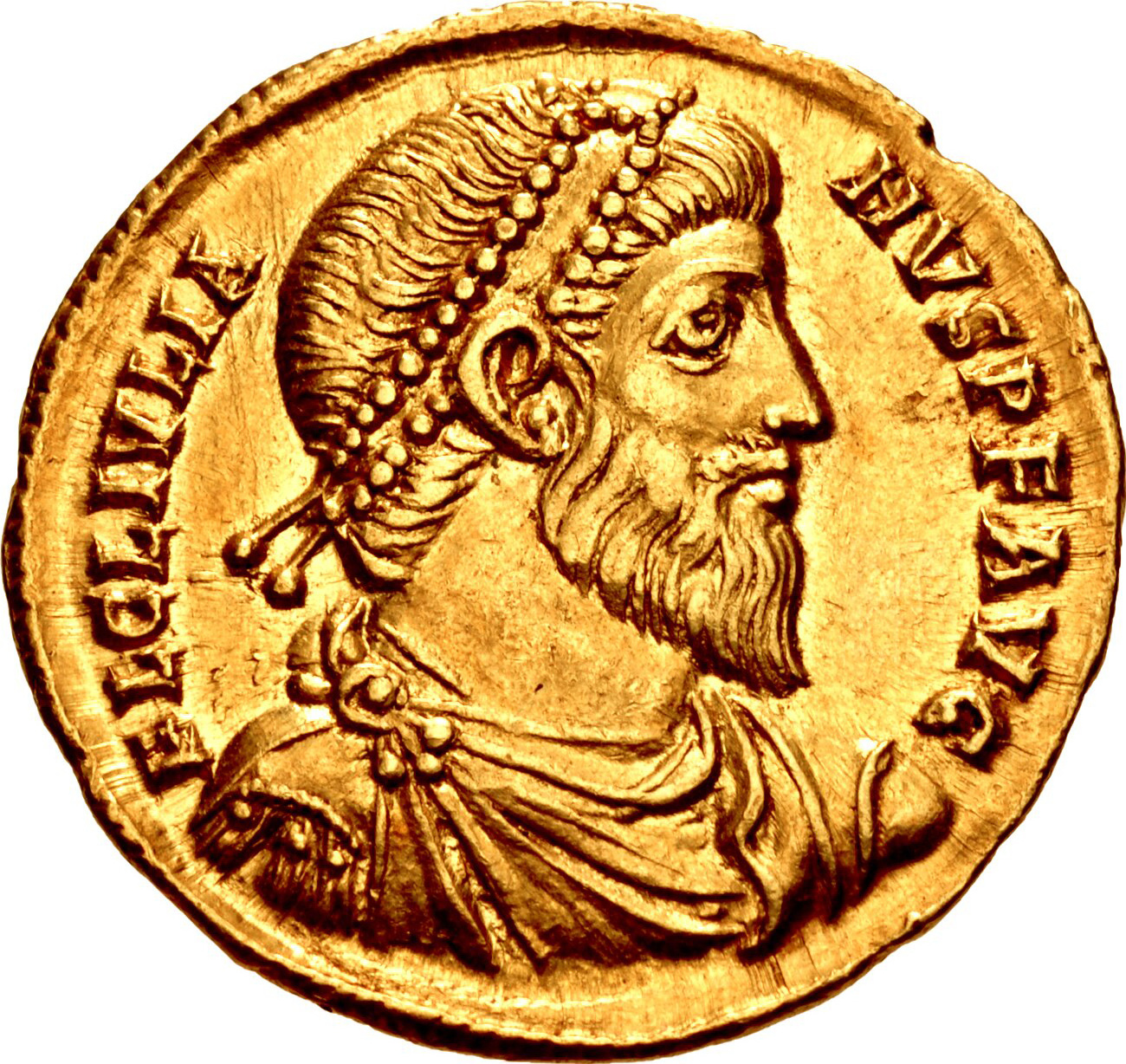
Julian (emperor)
Julian[i] (Latin: Flavius Claudius Julianus; Greek: Ἰουλιανός Ioulianos; 331 – 26 June 363) was the Caesar of the West from 355 to 360 and Roman emperor from 361 to 363, as well as a notable philosopher and author in Greek. His rejection of Christianity, and his promotion of Neoplatonic Hellenism in its place, caused him to be remembered as Julian the Apostate in Christian tradition. He is sometimes referred to as Julian the Philosopher.[4]
For other people with the same name, see Julian.Julian
3 November 361 – 26 June 363 (proclaimed in February 360)
6 November 355 – 360
331
Constantinople, Roman Empire
26 June 363 (aged 31–32)
Samarra, Mesopotamia, Sassanid Empire
Helena (m. 355, died 360)
- Greco-Roman polytheism
- Previously Christianity
A nephew of Constantine the Great, Julian was one of few in the imperial family to survive the purges and civil wars during the reign of Constantius II, his cousin. Julian became an orphan as a child after his father was executed in 337, and spent much of his life under Constantius's close supervision. However, the emperor allowed Julian to pursue freely an education in the Greek-speaking east, with the result that Julian became unusually cultured for an emperor of his time. In 355, Constantius II summoned Julian to court and appointed him to rule Gaul. Despite his inexperience, Julian showed unexpected success in his new capacity, defeating and counterattacking Germanic raids across the Rhine and encouraging the ravaged provinces' return to prosperity. In 360, he was proclaimed emperor by his soldiers at Lutetia (Paris), sparking a civil war with Constantius. However, Constantius died before the two could face each other in battle, having allegedly named Julian as his successor.
In 363, Julian embarked on an ambitious campaign against the Sasanian Empire. The campaign was initially successful, securing a victory outside Ctesiphon in Mesopotamia. However, he did not attempt to besiege the capital. Julian instead moved into Persia's heartland, but he soon faced supply problems and was forced to retreat northwards while being ceaselessly harassed by Persian skirmishers. During the Battle of Samarra, Julian was mortally wounded.[5] He was succeeded by Jovian, a senior officer in the imperial guard, who was obliged to cede territory, including Nisibis, in order to save the trapped Roman forces. Julian and Jovian were the last sole emperors to rule the whole Empire for their entire reign, after which it was permanently divided between a Western and Eastern court.[6]
Julian was the last non-Christian ruler of the Roman Empire, and he believed that it was necessary to restore the Empire's ancient Roman values and traditions in order to save it from dissolution. He purged the top-heavy state bureaucracy, and attempted to revive traditional Roman religious practices at the expense of Christianity. His efforts to build a Third Temple in Jerusalem were probably intended to harm Christianity rather than please Jews. Julian also forbade Christians from teaching and learning classical texts.
Religious issues[edit]
Beliefs[edit]
Julian's personal religion was both pagan and philosophical; he viewed the traditional myths as allegories, in which the ancient gods were aspects of a philosophical divinity. The chief surviving sources are his works To King Helios and To the Mother of the Gods, which were written as panegyrics, not theological treatises.[94]
As the last pagan ruler of the Roman Empire, Julian's beliefs are of great interest for historians, but they are not in complete agreement. He learned theurgy from Maximus of Ephesus, a student of Iamblichus;[95] his system bears some resemblance to the Neoplatonism of Plotinus; Polymnia Athanassiadi has brought new attention to his relations with Mithraism, although whether he was initiated into it remains debatable; and certain aspects of his thought (such as his reorganization of paganism under High Priests, and his fundamental monotheism) may show Christian influence. Some of these potential sources have not come down to us, and all of them influenced each other, which adds to the difficulties.[96]
According to one theory (that of Glen Bowersock in particular), Julian's paganism was highly eccentric and atypical because it was heavily influenced by an esoteric approach to Platonic philosophy sometimes identified as theurgy and also Neoplatonism. Others (Rowland Smith, in particular) have argued that Julian's philosophical perspective was nothing unusual for a "cultured" pagan of his time, and, at any rate, that Julian's paganism was not limited to philosophy alone, and that he was deeply devoted to the same gods and goddesses as other pagans of his day.
Because of his Neoplatonist background, Julian accepted the creation of humanity as described in Plato's Timaeus. Julian writes, "when Zeus was setting all things in order there fell from him drops of sacred blood, and from them, as they say, arose the race of men."[97] Further he writes, "they who had the power to create one man and one woman only, were able to create many men and women at once..."[98] His view contrasts with the Christian belief that humanity is derived from the one pair, Adam and Eve. Elsewhere he argues against the single pair origin, indicating his disbelief, noting for example, "how very different in their bodies are the Germans and Scythians from the Libyans and Ethiopians."[99][100]
The Christian historian Socrates Scholasticus was of the opinion that Julian believed himself to be Alexander the Great "in another body" via transmigration of souls, "in accordance with the teachings of Pythagoras and Plato".[101]
The diet of Julian is said to have been predominantly vegetable-based.[102]